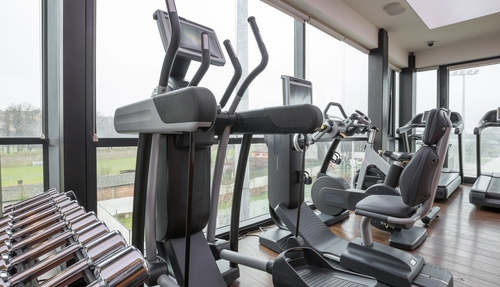Liability Releases — Products Liability
Posted in Personal Injury,Premises Liability on September 17, 2015
 Grebing v 24 Hour Fitness USA, Inc. (2nd Dist., January 29, 2105) 234 Cal.App.4th 631, 184 Cal.Rptr.3d 155.
Grebing v 24 Hour Fitness USA, Inc. (2nd Dist., January 29, 2105) 234 Cal.App.4th 631, 184 Cal.Rptr.3d 155.
A health club member who was injured while using exercise equipment known as a “low row machine” filed suit against the facility, asserting various theories of negligence and products liability. The plaintiff alleged that a connecting clip broke while he was pulling a handlebar connected to a cable running through pulleys and attached to weights, causing the handlebar to strike him in the forehead.
The defendant moved for summary judgment, arguing that the plaintiff had signed a release of liability assuming the risk of injury, which included the language: “Further, you understand and acknowledge that 24 Hour does not manufacture fitness or other equipment at its facilities, but purchases and/or leases equipment. You understand that 24 Hour is providing recreational services and may not be held liable for defective products.” The plaintiff opposed the motion, arguing that the defendant was in the chain of distribution and did not merely provide fitness services.
The trial court granted summary judgment and the court of appeal affirmed, holding that although products liability claims cannot be waived, the dominant purpose of the agreement was for services and not for provision of a product:
Unlike claims for ordinary negligence, products liability claims cannot be waived. (Westlye v. Look Sports, Inc. (1993) 17 Cal.App.4th 1715, 1743, 22 Cal.Rptr.2d 781.) However, a defendant cannot be liable based on products liability if the dominant purpose of the defendant’s transaction with the plaintiff was providing services rather than supplying a product. (Ontiveros v. 24 Hour Fitness USA, Inc. (2008) 169 Cal.App.4th 424, 434–435, 86 Cal.Rptr.3d 767 (Ontiveros).) …
Like in Ontiveros, 24 Hour’s evidence in support of its motion for summary judgment in this case established that it did not manufacture the exe rcise machine on which Grebing was injured, and that it purchased or leased exercise equipment for use by its members. In addition, 24 Hour showed that its fitness centers provided exercise machines, free weights, group exercise classes, personal training (for an additional fee), and locker room facilities. 24 Hour fitness centers also offered basketball courts, indoor and outdoor volleyball courts, racquetball and squash courts, swimming pools, steam rooms, saunas, whirlpools, tanning facilities, day spas, pro shops, juice bars, and restaurants. In fact, Grebing’s membership agreement allowed him to visit a variety of 24 Hour fitness clubs. Because the undisputed evidence showed that 24 Hour made the low row machine and other exercise equipment available for use by its members and provided a variety of other fitness services, the dominant purpose of 24 Hour’s membership agreement with Grebing was providing fitness services rather than supplying a product. As such, it cannot be liable based on a claim for products liability.
Finally, Grebing argues that the court improperly adjudicated his breach of warranty claim. In support of this contention, he states that a release cannot relieve a party of implied warranty liability for injury or loss resulting from that party’s gross negligence. Since there is no disputed issue of material fact concerning gross negligence, the release also bars Grebing’s cause of action for breach of warranty.

